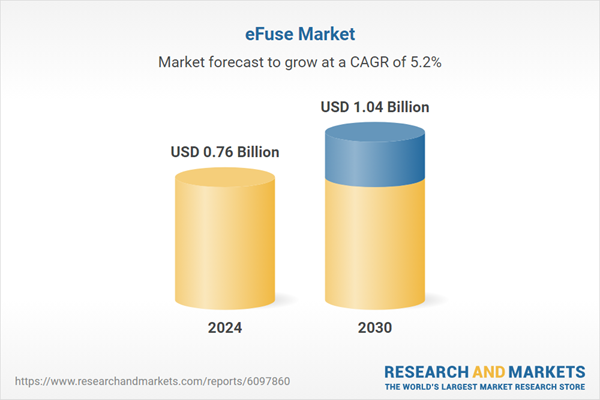Speak directly to the analyst to clarify any post sales queries you may have.
10% Free customizationThis report comes with 10% free customization, enabling you to add data that meets your specific business needs.
These features provide superior protection against overvoltage, overcurrent, short circuits, and thermal events, making them ideal for sectors like consumer electronics, automotive, telecom, and industrial automation. The growing miniaturization and complexity of electronics, coupled with the need for high-performance and reliable protection, are propelling eFuse adoption. Asia Pacific dominates the market due to its robust electronics manufacturing base, while North America and Europe are driven by technological innovation and regulatory requirements. The surge in electric vehicles, 5G infrastructure, and compact smart devices further underscores the growing reliance on programmable circuit protection solutions like eFuses.
Key Market Drivers
Rising Demand for Advanced Consumer Electronics
The growing popularity of high-performance and compact consumer electronics is a key driver for eFuse adoption. Devices such as smartphones, tablets, wearables, and laptops require intelligent circuit protection that supports miniaturization and high power density. eFuses meet these needs with built-in features like programmable current limits, thermal protection, and auto-retry, ensuring device reliability and safety.Global shipments of smartphones, wearables, and laptops have surged, with smartphones exceeding 1.39 billion units in 2024 and wearable devices reaching 530 million units. As the average power density in consumer electronics continues to rise, the need for advanced protection solutions becomes more pressing. Traditional fuses lack reset and diagnostic capabilities, while eFuses enable fault detection and self-recovery, reducing field failures and improving end-user experience. Their compact size and smart features make them ideal for modern electronics, driving demand across a range of consumer applications.
Key Market Challenges
High Initial Cost and Integration Complexity
Although eFuses provide advanced protection, their higher cost compared to conventional fuses poses a challenge in cost-sensitive markets. For manufacturers of entry-level consumer devices and low-cost industrial equipment, the price premium of eFuses may not be easily justified.Additionally, eFuses often require integration with digital control systems and programmable interfaces like I²C or PMBus, increasing design complexity. This complexity necessitates additional engineering expertise and development time, especially for teams unfamiliar with digital circuit protection.
Legacy systems designed for passive fuses may require redesigning PCBs or modifying power architectures to accommodate eFuses. These extra steps, combined with higher costs, can deter adoption, particularly for manufacturers operating on tight margins or those lacking resources for redesign and validation.
Key Market Trends
Integration of Programmability and Telemetry in Power Management ICs
An emerging trend in the eFuse market is the increasing integration of programmability and telemetry features in power management systems. Modern eFuses now allow configuration of critical parameters such as current limits, voltage thresholds, and delay timings via digital interfaces like I²C or PMBus.These programmable features are complemented by real-time telemetry, enabling system-level monitoring of voltage, current, temperature, and fault events. This capability enhances fault diagnosis and predictive maintenance in data centers, telecom networks, and industrial systems where uptime is crucial.
As digital infrastructure grows and AI-based monitoring becomes more prevalent, programmable eFuses are being adopted for applications that require proactive, adaptive protection mechanisms. These intelligent features are transforming eFuses from simple protection devices to vital components in smart power management ecosystems.
Key Market Players
- Texas Instruments Incorporated
- Analog Devices, Inc.
- STMicroelectronics
- ON Semiconductor Corporation
- NXP Semiconductors N.V.
- Renesas Electronics Corporation
- Infineon Technologies AG
- Vicor Corporation
- Broadcom Inc.
- Littelfuse, Inc.
Report Scope:
In this report, the Global EFuse Market has been segmented into the following categories, in addition to the industry trends which have also been detailed below:EFuse Market, By Product Type:
- Discrete eFuses
- Integrated eFuses
EFuse Market, By Application:
- Automotive
- Consumer Electronics
- Telecommunications
- Healthcare
- Others
EFuse Market, By Region:
- North America
- United States
- Canada
- Mexico
- Europe
- Germany
- France
- United Kingdom
- Italy
- Spain
- South America
- Brazil
- Argentina
- Colombia
- Asia-Pacific
- China
- India
- Japan
- South Korea
- Australia
- Middle East & Africa
- Saudi Arabia
- UAE
- South Africa
Competitive Landscape
Company Profiles: Detailed analysis of the major companies present in the Global EFuse Market.Available Customizations:
With the given market data, the publisher offers customizations according to a company's specific needs. The following customization options are available for the report.Company Information
- Detailed analysis and profiling of additional market players (up to five).
This product will be delivered within 1-3 business days.
Table of Contents
Companies Mentioned
- Texas Instruments Incorporated
- Analog Devices, Inc.
- STMicroelectronics
- ON Semiconductor Corporation
- NXP Semiconductors N.V.
- Renesas Electronics Corporation
- Infineon Technologies AG
- Vicor Corporation
- Broadcom Inc.
- Littelfuse, Inc.
Table Information
| Report Attribute | Details |
|---|---|
| No. of Pages | 185 |
| Published | June 2025 |
| Forecast Period | 2024 - 2030 |
| Estimated Market Value ( USD | $ 0.76 Billion |
| Forecasted Market Value ( USD | $ 1.04 Billion |
| Compound Annual Growth Rate | 5.1% |
| Regions Covered | Global |
| No. of Companies Mentioned | 10 |









